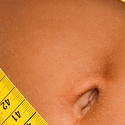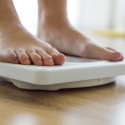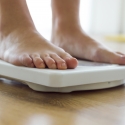In women with PCOS, the ovaries produce higher than normal amounts of testosterone that interferes with normal egg development and release.
Some of the eggs develop into cysts, which are little sacs filled with liquid. Instead of being released during
ovulation, as would occur in a normal menstrual cycle, these cysts build up in the ovaries and become enlarged. These cysts may also cause significant pain.
Because women with PCOS are not ovulating or releasing an egg each month, it is common for them to have irregular or missed menstrual cycles (periods).
Symptoms of PCOS
Symptoms of PCOS may be mild at first. Symptoms may begin in adolescence but often are not seen until well into adulthood. You may only have a few symptoms or many. The most common symptoms include:
- Acne
- Weight gain/obesity - normally around the waist
- Increased coarse hair growth on the face and body
- Thinning hair on the scalp
- Infrequent, irregular or absent menstrual cycles
- Infertility
- Skin tags on the neck and under the arms
Hormones
Both males and females produce sex hormones but in different amounts. In females, the ovaries produce the hormones estrogen, progesterone and testosterone (the predominant male hormone).
These hormones regulate a woman's menstrual cycle and control ovulation. Even though androgens are sometimes referred to as "male hormones," every female produces them. The two androgen hormones in women include testosterone and the adrenal hormone DHEAS.
Causes
It is estimated that ten percent (10%) or more of women who are of childbearing age have Polycystic Ovarian Syndrome (PCOS). No one really knows exactly what causes PCOS. Although the exact cause of PCOS is unknown, genetic factors may be involved. But we do know, however, that it is clearly related to an imbalance in a female's hormones. We also know that the underlying cause of PCOS relates to an imbalance of insulin use by the body. This imbalance is referred to as insulin resistance or metabolic syndrome. Research suggests that PCOS may be related to increased insulin production by the pancreas gland or resistance to insulin at the cellular level. Women with PCOS may produce too much insulin, which signals their ovaries to release extra male hormones. This excess production of male hormones may cause acne, unwanted hair growth, weight gain (especially around the waist and hips), irregular or absent menstrual cycles and infertility. Indeed, many women who are afflicted with PCOS do not have cysts on their ovaries yet experience all of the symptoms related to this syndrome.
There is currently no one specific test to diagnose PCOS. At the Wycoff Wellness Center, a diagnosis of PCOS is reached after your health care provider has taken a comprehensive medical history, performed a physical examination and reviewed the results of blood and/or saliva tests. The tests will measure hormone levels and rule out other causes of these symptoms.
Although there is no cure for PCOS, there are several ways that this condition can be managed.
Our primary focus for controlling PCOS is to restore hormonal balance naturally and promoting healthy weight loss.
Weight loss is vital to deal with the symptoms of PCOS as it helps to reduce the risks of developing common complications of PCOS such as high blood pressure and diabetes. Sometimes weight loss alone can restore hormone levels to normal, causing many of the symptoms to lessen or disappear. Often, hormonal replacement is necessary to help balance your female hormones.
An appropriate long-term eating program along with necessary supplements will often be major components of a comprehensive treatment plan for women with PCOS.
Call today to learn more about how the Wycoff Wellness services can help you achieve better health and wellness naturally!
FOLLOW THIS EASY 3 STEP PLAN TO PROVIDE NUTRITIONAL SUPPORT FOR POLYCYSTIC OVARIAN SYNDROME
1. Start each day with:

Click here to see the 8 Key Daily Essentials
2. Then add
TARGETED SUPPLEMENTS FOR POLYCYSTIC OVARIAN SYNDROME

BUY NOW - Click here to go to our Store
or Call 800-471-0255 to order
3. Then add
HERBAL FORMULAS FOR POLYCYSTIC OVARIAN SYNDROME
MYOMIN

CHI-F

|
OTHER HERBAL FORMULAS TO CONSIDER: DIABEND and OXYPOWER |
|
PCOS patients are also insulin resistant and have a high risk of developing diabetes. In this case, take Dr. Chi's DIABEND and OXYPOWER. |
Obesity can also make PCOS worse as well as increase the risk for heart disease and other conditions. For weight management, take Dr. Chi's SLENDER ALL, and PRO-METABOLIC along with Myomin. |
To Order Dr. Chi's Herbal Formulas
Call 800-471-0255




















